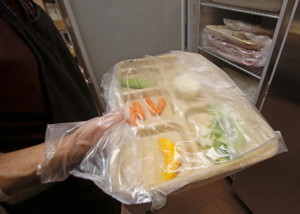Every weekday in an elementary school kitchen in Fargo, a worker fills a plastic tray with the day’s lunch offerings and seals, labels and places it in a freezer – all in the name of food safety.
 A similar process goes on for every meal at the Cass County Jail and at a facility in Dilworth, Minn., where food for Clay County Jail inmates is prepared. The meals are saved for about a week. When the oldest tray comes out, a new one goes in.
A similar process goes on for every meal at the Cass County Jail and at a facility in Dilworth, Minn., where food for Clay County Jail inmates is prepared. The meals are saved for about a week. When the oldest tray comes out, a new one goes in.
The jails and Fargo Public Schools are among a handful of institutions in the Fargo-Moorhead area that collect a sample tray in the event of a foodborne illness outbreak. If two or more people get sick after eating the same meal, a tray of food can be retrieved and tested for pathogens such as salmonella, norovirus or E. coli.
Deb Laber, director of nutrition services at Fargo schools, said the district began making a “fail safe tray” last year at Bennett Elementary; Fargo North High School was added this year.
Capt. Andrew Frobig, administrator at the Cass County Jail, said it is common, though, in his line of work.
“It’s an industry practice,” Frobig said.
Known in some circles as a sample or dummy tray, this food-safety process is commonly referred to in jails and prisons as a “dead man’s tray.” In fact, one website that sells food service products to corrections facilities advertises a “Dead Man Box,” a large metal box that can store trays with lids.
